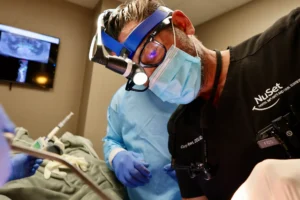If missing teeth have made it challenging for you to enjoy your favorite meals, you’re not alone. Over 170 million Americans are estimated to be missing at least a tooth, and over 30 million are missing all their teeth.
This limitation deprives you of culinary pleasures and could impact your nutritional health, leaving you reliant on soft, often less nutritious options like mashed potatoes and cottage cheese. However, dental implants offer a promising solution, enabling you to eat confidently once again.
Dental implants serve as replacements for your natural teeth. They are durable and permanent solutions to regain your chewing ability. If you’re considering dental implants, you’re likely curious about any temporary dietary changes required during recovery.
Although certain foods should be avoided immediately after the dental implant procedure, you can eat normally again after two weeks.
Let’s discuss what to eat and when to eat below!
What to Expect Immediately After Dental Implants
It’s normal to experience some changes and discomfort after getting dental implants. This part of your healing journey is critical, and knowing what to expect can help you prepare better for the process. Below are what to expect:
Swelling and bruising
In the first few days following your surgery, you might notice swelling and bruising around the implant site and possibly in your face. This is your body’s natural response to the surgery, and it is absolutely normal.
Pain and discomfort
Feeling some pain and discomfort is common after dental implant surgery. After your surgery, we will prescribe medication to help manage this discomfort.
You may experience bleeding
A small amount of bleeding near the implant site is normal within the first 24 to 48 hours. If it continues, say for more than 48 hours, contact us to help you identify what the problem may be.
You may experience difficulty eating
You’ll initially find it challenging to eat as you normally would. Chewing near the implant site might be uncomfortable, so you may need to adjust your diet temporarily. Our dentist will work with a nutritionist to provide a list of foods suitable for you for the first few weeks.
Understanding these immediate aftereffects is vital for a smooth recovery. While these symptoms may cause some inconvenience, they are temporary and a natural part of the healing process. We will guide you through this period with advice and support to ensure your implant heals correctly and efficiently.
How Long Do I Have to Wait to Eat Normally After Dental Implants?
The time needed before you can return to your usual diet after dental implants varies. It largely depends on the complexity of your dental surgery and how quickly you heal.
In the first few days after your procedure, it’s best to stick to soft foods and liquids. Foods like soups, smoothies, and applesauce are good choices because they require little to no chewing.
After about one to two weeks, as your comfort improves, you can gradually introduce semi-solid foods into your diet. Think of easy-to-chew foods like scrambled eggs, pasta, and soft-cooked vegetables. It’s important to continue avoiding hard, crunchy, or sticky foods that could disrupt the implant area.
Your implant should be significantly healed by the six- to eight-week mark. Now, you’re allowed a more varied diet; however, complete integration of the implant with your jawbone, a process known as osseointegration, can take anywhere from three to six months. During this period, you should still exercise some caution with what you eat.
After receiving the final prosthetic component, such as a crown, you might need a short adjustment period to get used to eating with it.
Remember, everyone heals at their own pace, so give yourself time. We will provide personalized advice based on how your recovery is progressing.
What You Should Eat While Your Implant is Healing
Right after your dental implant surgery, choosing the right foods is essential for healing. Here’s a list of what to eat to ensure your implant heals well without any complications:
- Smoothies
- Soups and broths
- Applesauce
- Mashed potatoes
- Scrambled eggs
- Yogurt
- Oatmeal
- Cottage cheese
Choosing these foods minimizes the risk of irritating your implant site and can help speed up your healing process.
Tips for Eating After Dental Implant Surgery
After your dental implant surgery, eating might feel like a challenge. Here are some tips to make eating easier and help ensure your implant heals properly.
- Take your time while eating to avoid putting unnecessary pressure on your implant site.
- If possible, chew food on the side opposite your implant to minimize disturbance to the area.
- Avoid hot foods. Hot foods can increase swelling and discomfort, so choose cool or room-temperature dishes.
- Drink plenty of water to stay hydrated, but avoid using a straw, as the suction can interfere with healing.
- Cut food into small pieces. Smaller pieces are easier to chew and less likely to irritate your implant site.
- For front tooth implants, try not to bite directly into food. Instead, cut food into small pieces that can be easily chewed with your back teeth.
- Gently rinse your mouth with water after meals to keep the implant area clean and reduce the risk of infection.
Foods to Avoid While Your Implant is Healing
While your dental implant is healing, it’s important to avoid certain foods that can disrupt the healing process. Here are foods to avoid for a smooth recovery:
- Hard foods, such as nuts, seeds, hard candies, and ice, can put too much pressure on the implant site.
- Sticky foods: gum, caramel, and other sticky sweets can pull on the implant, potentially dislodging it.
- Crunchy foods: Chips, popcorn, and hard bread should be avoided as they can irritate the healing tissue.
- Chewy foods: Meat that requires a lot of chewing, like steak or jerky, can strain the implant area.
- Spicy foods can irritate the gums and implant site, causing discomfort.
- Extremely hot foods and liquids: Very hot meals and beverages can exacerbate swelling and sensitivity.
How to Chew Your Food When Your Implant is Healing
Chewing correctly while your dental implant heals is crucial to avoid complications and ensure a smooth recovery. Here’s how to do it safely:
- Apply minimal force when chewing to reduce pressure on your implant site.
- Stick to foods that require little to no chewing force, such as mashed potatoes, oatmeal, and smoothies.
- Try to distribute the chewing force evenly by using both sides of your mouth, even if it initially feels awkward.
- Don’t chew directly on the implant. If your implant is on one side of your mouth, try to use the other side for the majority of your chewing.
Following these simple practices can help ensure that your dental implant heals correctly and quickly as well as set you up for a successful recovery.
Ready to Enjoy Your Favorite Foods Again?

As you navigate the healing process after dental implant surgery, remember that the temporary changes to your diet and eating habits are steps toward significantly improving your quality of life.
While it may require some patience and adjustments in the short term, the benefits of dental implants are well worth the effort. Soon, you’ll be back to savoring all your favorite meals, just as you did before—or perhaps even better, knowing that your dental health is on solid ground.
Nuset Dental Implants and Oral Surgery will provide the necessary support for your healing. After the implant, we don’t leave you to handle the healing process alone; we hold your hands throughout your journey. Schedule a consultation with us today to get started.
Frequently Asked Questions
How long after dental implant surgery can I eat solid food?
You should wait until your dentist gives you the go-ahead before returning to solid foods. This is typically after the initial healing period, which can vary but often falls within the first two weeks post-surgery. Start with soft, non-challenging foods and gradually reintroduce harder foods as your comfort and healing process allows.
How long does it take for dental implants to settle?
Dental implants usually take 3–6 months to fully integrate with the jawbone in a process known as osseointegration. However, the total time for an implant to settle completely, including the gum tissue’s healing and the final crown’s fitting, can sometimes take up to a year.
Can I eat a burger after a dental implant?
Yes, but waiting until your dental implant has fully healed and your dentist has confirmed it’s safe is important. Depending on your case, this might mean waiting several weeks or even months. When you return to eating burgers, consider starting with softer, easier-to-chew options and cutting them into small, manageable pieces.
How long does it take to heal after tooth implants?
The initial healing phase, where the gum tissue starts to heal around the implant, typically takes 2 to 3 weeks. However, complete healing and integration of the implant with the jawbone can take 3 to 6 months or more, depending on individual factors like overall health, the complexity of the dental work, and adherence to post-operative care instructions.





